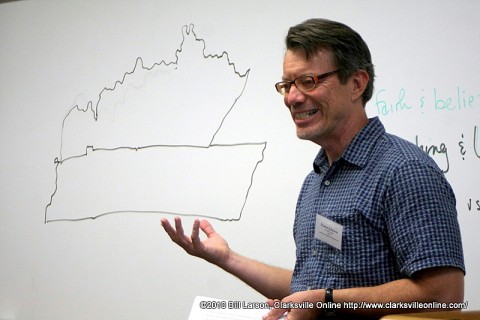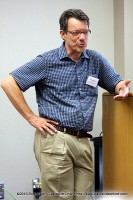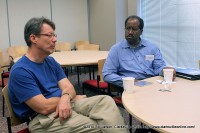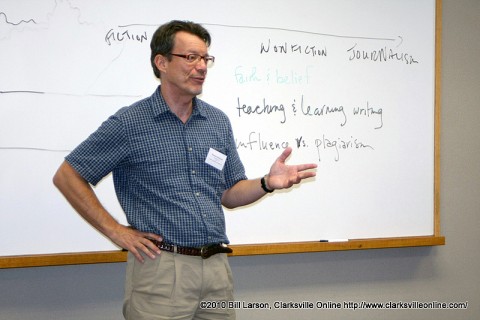
Fenton Johnson, the ninth of nine children, had just come from two months of taking care of his 94-year-old mother prior to his arrival at the Sixth Annual Clarksville Writers’ Conference. Happy to no longer be treated as the “baby of the family” by his older siblings, he said he was g9lad to be back in the South.
Author of novels, Crossing the River and Scissors, Paper, Rock, Fenton reminded everyone that Kentucky is and is not of the South. On one hand, he said the famous Southern writer Eudora Welty claimed that her own grandmother, on returning from a visit to the Northern states, would make Eudora’s father stop the car when they reached Kentucky so that she could touch the ground in the South.” On the other, Fenton reminded those in the conference audience that Kentucky did not secede from the Union during the Civil War.

Fenton said that his mother had been a Protestant prior to his Catholic father, so she became a convert. Fenton was named for a monk (and not for the poet Fenton Johnson).
Fenton Johnson has written two memoirs, Geography of the Heart and Keeping Faith: A Skeptic’s Journey. His essays and stories have appeared in Harper’s Magazine, the New York Times and many literary quarterlies. His has received, among others, fellowships from the Guggenheim Foundation and the National Endowment for the Arts. He is now on the faculty of the creative writing program at the University of Arizona.
He presented many questions for the thinking writer to consider. Fenton was currently reading a book, Dreams from My Father: A Story of Race and Inheritance, by Barack Obama. His favorite quote from the book was, “Each of us chose a costume, armor against uncertainty.” Fenton said each of us has infinite closets of the heart.
As an example, Fenton described being made up like a drag queen by his cousin so that he could get inside a character (Delores Heights) he had created. He admitted that he felt very vulnerable walking on the streets of San Francisco because “there is no way you can run in those high heels!” The ability to write about a character requires that one get into the mindset of that character and see from her eyes.
According to Fenton, seeing from the point of view of a woman makes many people assume that what separates us is stronger than that which joins us. “We all have carefully constructed illusions about the chaos of life,” he added.
Fenton said that his hardest writing came when he created an HIV positive character. “Sex is as uncomfortable a subject as ever. Desire is about the theater of life,” Fenton surmised. “We Americans like our facts straight.”
 Albert Einstein was convinced that “those of us who believe in physics, know that the past, present and future are an illusion,” Fenton reminded his audience.
Albert Einstein was convinced that “those of us who believe in physics, know that the past, present and future are an illusion,” Fenton reminded his audience.
Illustrating the illusions that some people create, Fenton said that around 1894, a Kentuckian sold a New Yorker a cabin he reputed to be the one in which Abraham Lincoln was born. (It seems that it was put together by logs found on the property but was extremely unlikely to have been Lincoln’s birthplace!) However, it toured the country as such and had to be “restored” for each city in which it was displayed; since it did not fit properly when put back together, it lost about two inches each time it was reconstructed. Eventually a group of prominent Americans decided it should be placed on the Kentucky farm and hired a well-known architect to design the structure in which it was to be placed. They ended up having to remove another two feet of the cabin because of the architect’s vision, so it was then “about the size of a treehouse,” Fenton explained.
The cabin is now described as “traditionally held” to be the birthplace of Lincoln or it now “symbolizes” his birthplace.
Fenton explained, “Truth is enduring; facts are malleable. Truth proves itself over time after generations of testing. There is a universal longing for saints and profits so we have carefully constructed illusions to help us cope with the chaos of life.”

For the question of whether a written work is nonfiction or fiction, one must answer, “How much of this did you make up?” for the former, and “How much of this is true?” for the latter.
“What is the relationship of the writer to the truth?” he asked. “You must report to the best of your ability, but as a writer, you prefer the most interesting path—and find that it is usually the most difficult. You have to look at the material at hand and decide if you have plumbed the depths as deeply as they can be plumbed.”
In Fenton Johnson’s world, “the goal of writing is to touch someone else’s heart. It is an abstract media that allows us to feel and learn something about the human condition. I think it is a mystery and is incredibly difficult. Writing really is hard.”



